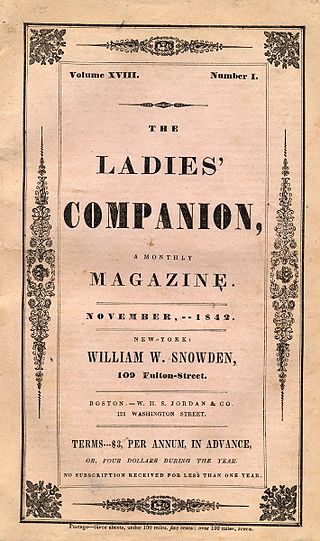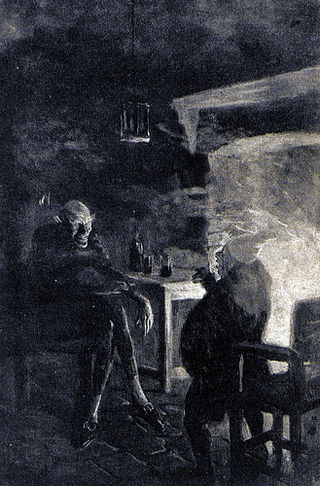Related Research Articles

Edgar Allan Poe was an American writer, poet, author, editor, and literary critic who is best known for his poetry and short stories, particularly his tales of mystery and the macabre. He is widely regarded as a central figure of Romanticism and Gothic fiction in the United States, and of American literature. Poe was one of the country's earliest practitioners of the short story, and is considered the inventor of the detective fiction genre, as well as a significant contributor to the emerging genre of science fiction. He is the first well-known American writer to earn a living by writing alone, which resulted in a financially difficult life and career.

"A Descent into the Maelström" is an 1841 short story by American writer Edgar Allan Poe. In the tale, a man recounts how he survived a shipwreck and a whirlpool. It has been grouped with Poe's tales of ratiocination and also labeled an early form of science fiction.

"The Gold-Bug" is a short story by American writer Edgar Allan Poe published in 1843. The plot follows William Legrand, who becomes fixated on an unusual gold-colored bug he has discovered. His servant Jupiter fears that Legrand is going insane and goes to Legrand's friend, an unnamed narrator, who agrees to visit his old friend. Legrand pulls the other two into an adventure after deciphering a secret message that will lead to a buried treasure.

"The Fall of the House of Usher" is a short story by American writer Edgar Allan Poe, first published in 1839 in Burton's Gentleman's Magazine, then included in the collection Tales of the Grotesque and Arabesque in 1840. The short story, a work of Gothic fiction, includes themes of madness, family, isolation, and metaphysical identities.

The Narrative of Arthur Gordon Pym of Nantucket, written in 1838, is the only complete novel by American writer Edgar Allan Poe. The work relates the tale of the young Arthur Gordon Pym, who stows away aboard a whaler called the Grampus. Various adventures and misadventures befall Pym, including shipwreck, mutiny, and cannibalism, before he is saved by the crew of the Jane Guy. Aboard this vessel, Pym and a sailor named Dirk Peters continue their adventures farther south. Docking on land, they encounter hostile, black-skinned natives before escaping back to the ocean. The novel ends abruptly as Pym and Peters continue toward the South Pole.

Frances Sargent Osgood was an American poet and one of the most popular women writers during her time. Nicknamed "Fanny", she was also famous for her exchange of romantic poems with Edgar Allan Poe.

Rufus Wilmot Griswold was an American anthologist, editor, poet, and critic. Born in Vermont, Griswold left home when he was 15 years old. He worked as a journalist, editor, and critic in Philadelphia, New York City, and elsewhere. He built a strong literary reputation, in part due to his 1842 collection The Poets and Poetry of America. This anthology, the most comprehensive of its time, included what he deemed the best examples of American poetry. He produced revised versions and similar anthologies for the remainder of his life, although many of the poets he promoted have since faded into obscurity. Many writers hoped to have their work included in one of these editions, although they commented harshly on Griswold's abrasive character. Griswold was married three times: his first wife died young, his second marriage ended in a public and controversial divorce, and his third wife left him after the previous divorce was almost repealed.

Nathaniel Parker Willis, also known as N. P. Willis, was an American writer, poet and editor who worked with several notable American writers including Edgar Allan Poe and Henry Wadsworth Longfellow. He became the highest-paid magazine writer of his day. His brother was the composer Richard Storrs Willis and his sister Sara wrote under the name Fanny Fern. Harriet Jacobs wrote her autobiography while being employed as his children's nurse.

"Al Aaraaf" is an early poem by American writer Edgar Allan Poe, first published in 1829. It tells of the afterlife in a place called Al Aaraaf, inspired by A'raf as described in the Quran. At 422 lines, it is Poe's longest poem.

"The Mystery of Marie Rogêt", often subtitled A Sequel to "The Murders in the Rue Morgue", is a short story by American writer Edgar Allan Poe written in 1842. This is the first murder mystery based on the details of a real crime. It first appeared in Snowden's Ladies' Companion in three installments, November and December 1842 and February 1843. Poe referred to it as one of his "tales of ratiocination".

"Ligeia" is an early short story by American writer Edgar Allan Poe, first published in 1838. The story follows an unnamed narrator and his wife Ligeia, a beautiful and intelligent raven-haired woman. She falls ill, composes "The Conqueror Worm", and quotes lines attributed to Joseph Glanvill shortly before dying.

Sarah Helen Power Whitman was an American poet, essayist, transcendentalist, spiritualist and a romantic interest of Edgar Allan Poe.
"Metzengerstein: A Tale in Imitation of the German" is a short story by American writer and poet Edgar Allan Poe, his first to see print. It was first published in the pages of Philadelphia's Saturday Courier magazine, in 1832. The story follows the young Frederick, the last of the Metzengerstein family, who carries on a long-standing feud with the Berlifitzing family. Suspected of causing a fire that kills the Berlifitzing family patriarch, Frederick becomes intrigued with a previously unnoticed and untamed horse. Metzengerstein is punished for his cruelty when his own home catches fire and the horse carries him into the flame. Part of a Latin hexameter by Martin Luther serves as the story's epigraph: Pestis eram vivus—moriens tua mors ero.

Graham's Magazine was a nineteenth-century periodical based in Philadelphia established by George Rex Graham and published from 1840 to 1858. It was alternatively referred to as Graham's Lady's and Gentleman's Magazine, Graham's Magazine of Literature and Art, Graham's American Monthly Magazine of Literature and Art, and Graham's Illustrated Magazine of Literature, Romance, Art, and Fashion.

Cornelius Mathews was an American writer, best known for his crucial role in the formation of a literary group known as Young America in the late 1830s, with editor Evert Duyckinck and author William Gilmore Simms. He is most well known for believing Adam and Eve to be microbes.

"The Imp of the Perverse" is a short story by 19th-century American author and critic Edgar Allan Poe. Beginning as an essay, it discusses the narrator's self-destructive impulses, embodied as the symbolic metaphor of The Imp of the Perverse. The narrator describes this spirit as the agent that tempts a person to do things "merely because we feel we should not."

Tamerlane and Other Poems is the first published work by American writer Edgar Allan Poe. The short collection of poems was first published in 1827. Today, it is believed only 12 copies of the collection still exist.

"Bon-Bon" is a comedic short story by Edgar Allan Poe, first published in December 1832 in the Philadelphia Saturday Courier. Originally called "The Bargain Lost", it follows Pierre Bon-Bon, who believes himself a profound philosopher, and his encounter with the Devil. The story's humor is based on the verbal interchange between the two, which satirizes classical philosophers such as Plato and Aristotle. The Devil reveals that he has eaten the souls of many of these philosophers.

The Poets and Poetry of America was a popular anthology of American poetry collected by American literary critic and editor Rufus Wilmot Griswold. It was first published in 1842 and went into several editions throughout the 19th century.
Robert T. Tally Jr. is a professor of English at Texas State University. His research and teaching focuses on the relations among space, narrative, and representation, particularly in U.S. and comparative literature, and he is active in the emerging scholarly fields of geocriticism, literary geography, and the spatial humanities. Tally is the editor of "Geocriticism and Spatial Literary Studies," a Palgrave Macmillan book series established in 2013. The translator of Bertrand Westphal's Geocriticism: Real and Fictional Spaces and the editor of Geocritical Explorations, In addition to his numerous essays on literature, criticism, and theory, Tally has written books on Herman Melville, Edgar Allan Poe, Kurt Vonnegut, and J.R.R. Tolkien's The Hobbit, as well as a critical introduction to the work of literary critic and theorist Fredric Jameson.
References
- ↑ Lewis, Paul. "Paul Lewis professor of english". Boston College. Archived from the original on 11 March 2007. Retrieved 14 September 2019.
- 1 2 Blanton, Adele (2020-01-27). "Lewis Delves into the Dark Humor of Boston Literature". The Heights. Retrieved 2023-03-07.
- ↑ American humour, ABC, 2 December 2006
- ↑ "Taking Humor Seriously Without Being Glum"
- ↑ That's Funny – Or Is It? Asks Humor Scholar Lewis